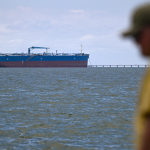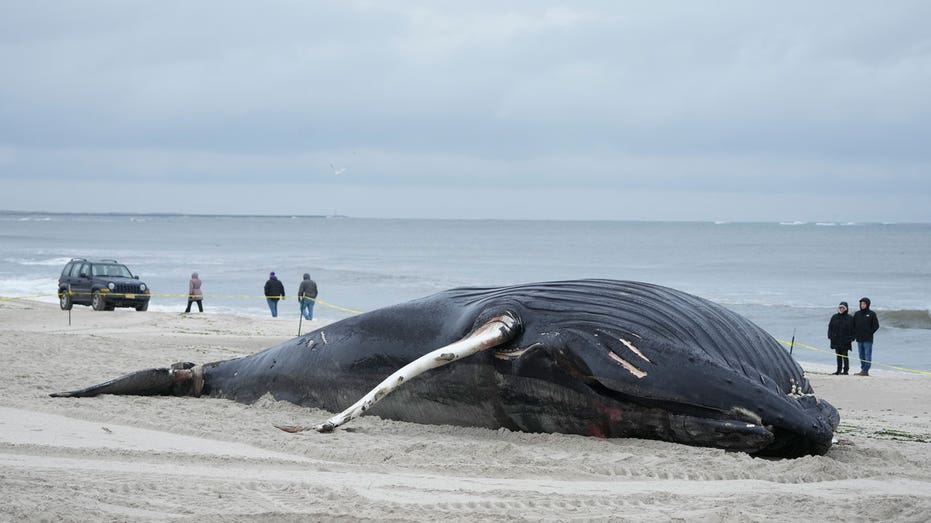A senior Biden administration scientist authored an internal memo warning of the impacts offshore wind development may have on marine life months before the recent spate of whale deaths along the East Coast.
Sean Hayes, the National Oceanic and Atmospheric Administration’s (NOAA) chief of protected species, penned the memo in May 2022 and sent it to Bureau of Ocean Energy Management (BOEM) lead biologist Brian Hooker, also copying more than a dozen other scientists from the two agencies. The memo highlighted Hayes’ concerns about how offshore wind construction and surveying could disrupt the endangered Atlantic right whale.
“The development of offshore wind poses risks to these species, which is magnified in southern New England waters due to species abundance and distribution,” Hayes wrote in the letter dated May 13. “These risks occur at varying stages, including construction and development, and include increased noise, vessel traffic, habitat modifications, water withdrawals associated with certain substations.”
“The focus of this memo is on operational effects, and as such, focuses on potential oceanographic impacts driving right whale prey distribution, but also acknowledges increased risks due to increased vessel traffic and noise,” he continued. “However, unlike vessel traffic and noise, which can be mitigated to some extent, oceanographic impacts from installed and operating turbines cannot be mitigated for the 30-year lifespan of the project, unless they are decommissioned.”
DOZENS OF NJ MAYORS CALL FOR IMMEDIATE OFFSHORE WIND MORATORIUM AFTER LATEST WHALE DEATHS
Hayes added that offshore wind development may also impact the distribution, abundance and availability of typical right whale food by causing oceanographic changes. Such infrastructure may also increase entanglement risks posed to whales since fishing techniques and efforts would be impact by wind farms.
The revelation that administration officials were concerned about how offshore wind impacts whales comes amid an uptick in whale deaths along the Atlantic coast. At least 12 dead whales have beached in New Jersey, New York, Delaware, Maryland and Virginia since December.
Discoveries of the beached whales have sparked calls from mayors, lawmakers and conservation groups for the federal government and state governments to implement a moratorium on offshore wind development pending a full investigation into the increasing number of deaths. While there are just two existing operational wind farms off the East Coast, more than 10 others are in various stages of development.
The Biden administration announced in 2021 that it intended to approve a staggering 30 gigawatts of offshore wind to be developed by 2030 as part of its climate agenda.
“We’ve got a very tight window to save these whales,” David Stevenson, the president of the American Coalition for Ocean Protection (ACOP), told Fox News Digital in an interview. “BOEM is trying to ignore the operational noise that could drive them into these vessel areas. So it’s a big, big, big disaster. This letter just verifies that it’s a huge problem.”
Stevenson, who founded ACOP to mount legal defenses in response to offshore wind development on behalf of local shoreline communities, added that large federal offshore wind leases indirectly cause whales to swim into shipping channels which are full of vessels. A large number of whale deaths each year are the result of vessel strikes.
HUNDREDS OF NJ RESIDENTS RALLY AGAINST GREEN ENERGY OVER ENVIRONMENTAL CONCERNS
“If you look at the lease areas, they’ve all got this triangular shape,” he continued. “The reason for that is they are sandwiched between major shipping channels. So, if you harass the whales out of the lease area — and BOEM says in every one of their draft environmental impact statements that this is going to be a major impact on the whales — they are going to be harassed if they leave that lease area.”
“They’re going right into the shipping channels. Most whales die from vessel strikes, so you can’t move them out of a relatively safe area into the worst place they can possibly be.”
However, despite the May letter from Hayes and pleas from environmental groups, Biden administration officials have reiterated on multiple occasions that there isn’t sufficient evidence linking offshore wind to whale deaths and have noted there has been an unusual mortality event for the species stretching back years.
On Jan. 18, BOEM and NOAA officials held a press briefing, reiterating there wasn’t evidence offshore wind development was harmful and last week, the federal Marine Mammal Commission stated in a report that “despite several reports in the media, there is no evidence to link these strandings to offshore wind energy development.”
“The Bureau of Ocean Energy Management discussed with NOAA Fisheries that additional information was required to evaluate ‘conservation buffer zones’ in some wind energy areas for the purposes of North Atlantic right whale protection,” NOAA spokesperson Lauren Gaches told Fox News Digital in an email.
“This advice was compiled by NOAA Fisheries experts and delivered in a letter dated May 13, 2022. Since then, NOAA Fisheries and BOEM have released a joint draft strategy to protect and promote the recovery of North Atlantic right whales while responsibly developing offshore wind energy,” Gaches added. “The points raised in the letter are described in the joint strategy.”























